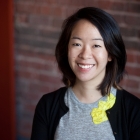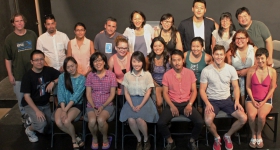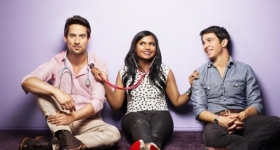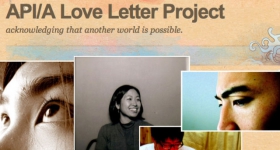AT THE TEMPLE on 16th and Dolores streets in San Francisco's Mission District, Robert Bernardo steps in front of the Sha'ar Zahav congregation to deliver the Rosh Hashanah sermon. He recalls the December night three years ago when he first entered the Sha'ar Zahav sanctuary. "I very much felt like a stranger—not only because I am Filipino, but also because I was in the process of converting to Judaism," he tells the synagogue. "I really had no idea how I would be received. I wondered if I would meet other Filipinos, other Asian Pacific Islanders and other people of color."
He explains that the Hebrew word ger not only means "stranger," but also "convert." He urges the congregation to embrace, instead of fear, the stranger.
"How exactly can we do this? How can you embrace the stranger?" he asks them.
As the Asian American Jewish populace grows, the Asian American community may want to start considering that same question. While Asian Jews have existed at least since 1163, when a synagogue was built in Kaifeng in central China's Henan province, many say the population has been expanding rapidly in recent years, fueled in part by the influx of Chinese adoptees who are raised Jewish in the US and intermarriage between Asian Americans and Jews-an estimated 50 percent of Jews outmarry, while Asian American outmarriage rates can be as high as 33 percent among some ethnic groups.
The number of Asian American Jews is hard to come by, since Jewish organizations don't track them. But Bernardo says the biggest growth in this community is yet to come. "There will be an explosion in the next five to 10 years," he predicts. "We're seeing the very beginning of it."
One group that is increasingly choosing to join Judaism is lesbian, gay, bisexual and transgender (LGBT) Asian Americans like Bernardo. There are a noticeable number of gays who are also Jewish and Asian says Jonathan Schwartz, director of the Bureau for Jewish Education's Jewish Community Library in San Francisco. At Sha'ar Zahav, Bernardo sees about 10 to 15 LGBT Asian American faces among the synagogue's 500 families.
And, while it may not sound like many, Dafna Wu, a lesbian hapa Chinese Jew, says with a laugh, "We stick together, we Chinese Jews."
***
ROBERT BERNARDO remembers the moment he officially became Jewish as the moment he almost drowned. In March 2005, after more than a year of studying with a rabbi and learning Hebrew, Bernardo thought he was ready for the mikvah, the ritual of immersion in water required for all converts. Fully naked and completely clean, he descended the seven steps into the warm serene water surrounded by quiet chanting. Then, after being informed he could neither hold onto the side of the bath nor touch the floor, he saw no other option but to curl into a fetal position and, flustered and sputtering water, do a somersault. The bemused rabbi asked, "Are you OK in there?" The second time went off without a hitch, Bernardo assures.
Bernardo, 38, has never been one to do things the conventional way, instead preferring to constantly expand traditional definitions. Raised Catholic, as 80 percent of Filipinos are, he grew up as an altar boy. But Catholicism became untenable while attending a Catholic high school in San Mateo and constantly hearing that gays would go to hell. Bernardo came out to his parents at age 17, but feared retribution if he came out at school. He left Catholicism during that time and was nonreligious for many years. "Organized religion didn't do anything for me, since most say evil, reprehensible things about gay people," he says.
Then five years ago, Bernardo decided, "It's time to find a sense of purpose again." He knew he would not return to Christianity, so he explored other religions, having lunch with his Hindu, Muslim, Buddhist, Wiccan and Unitarian Universalist friends in succession. Finally, he lunched with a Jewish friend. "That's the one that really opened my eyes—I thought, 'wow.'"
Bernardo was drawn to Judaism because of the tenet that people are born as beautiful beings. "Growing up as a Catholic, I could never understand the original sin thing," he says. "How could a baby be a sinner? It defies logic." He also liked the emphasis on questioning Jewish teachings, instead of blindly accepting rules. Most of all, he agreed with the idea that Jews, "as beautiful creatures, have a duty to repair the world and leave it even more beautiful than when we arrived."
Bernardo says the growing community of LGBT Asian American Jews is helping break stereotypes of what a Jewish person looks like. At the San Francisco Gay Pride Parade in 2005, as he marched by with his synagogue's contingent, he heard people say, "You're not Jewish."
Likewise, Asian Americans find it hard to believe he is Jewish. "When I wear my yarmulke, they ask, 'Why are you wearing that little beanie?' People just don't equate Jewish with Asian in the same breath."
Bernardo speculates that many LGBT Asian Americans are choosing to convert because their partners are Jewish (his own partner is a Catholic Italian). But overall, Bernardo agrees it's about visibility. "When Asians who want to convert see other Asian Jews, it makes it OK," he says. "It's a similar journey to my coming out as a gay man. I didn't know there were gay Asians. It's about breaking down stereotypes and barriers. They're not used to seeing gay Asian Jews, but I think they will."
Bernardo sees his social justice activism as part of this beautification process. A former San Francisco Police Department hate crimes detective, Bernardo serves as president of the Gay Asian Pacific Alliance and was voted to be the Grand Marshal of the San Francisco Gay Pride Parade in 2006. He also organized the first religious coalition to support gay marriage in the city's Chinese New Year Parade and the first Asian rally in San Francisco in support of gay marriage, during the "Summer of Love 2004," when the city began issuing marriage licenses to gay and lesbian couples.
He serves on South San Francisco's Civil Service Commission, and is even considering running for mayor of that city, where he now lives. And, yes, it would make him the first openly gay Asian Jewish mayor.
***
WHEN DAFNA WU was growing up, schoolmates called her "Dafna Wu, the Chinese Jew."
"I thought I was the only Chinese Jew in the world," she says, with a slight Valley accent that betrays her West L.A. upbringing.
Today, her 6-year-old daughter Amalia goes to a Jewish day school in San Francisco with Ashkenazi Jews, African American Jews and at least three other Chinese Jews. "One day, she's gonna look around, see a curly headed kid and say, 'You don't look Jewish,'" says Wu, 44, who works in San Francisco as a registered nurse.
Wu says the Jewish community at the birthplace of civilization most likely did not look like Polish or Russian Jews. "They certainly weren't Caucasian," she says. "It's because of white domination that the picture of what a Jew looks like is more Woody Allen than my face."
There are parallels between Jewish and Asian cultures. First, there's mahjong, favored by elders in both groups. Then there's Christmas, when many Jews eat at Chinese restaurants, which tend to be the only establishments open during the holiday. They also share similar values around the importance of food, education, family, elders and ancestors. "It's a very seamless kind of connection," Wu says.
The roots of Wu's Judaism run deep. Her father is Chinese; her mother is a non-practicing Ashkenazi Jew. Born and raised in Brazil, multiculturalism has been intuitive to her. Her parents gave her a Hebrew name common in Israel, but they left it up to her to decide to explore Judaism. After moving to West L.A., she fell in with the Jewish crowd, after being snubbed by her Chinese classmates for not looking or speaking Chinese.
She calls herself at that time "an orphan Jew," since her parents were not affiliated with a synagogue, and, during Jewish holidays, while all her friends would be exempt from school, she would ask her mother, "Why can't I go to temple?" She eventually began to attend synagogue with a friend in high school, and, as part of her teenaged rebellious phase, chastised her parents for not being observant Jews. She says all of her girlfriends have been Jewish, her first love was Jewish, and today, the woman with whom she has had three children is Jewish.
In 1997, her three-year-old daughter Isa Leah died of a rare degenerative disease unique to Ashkenazi Jews that can be traced back hundreds of years. "She looked very Ashkenazi, and was beautiful and perfect," Wu says, softly. From then on, she would no longer let anyone question whether she was "Jewish enough."
***
BERNARDO WILL BE one of the subjects of a documentary called Asian American Jews, slated for release next year. "It's being done by Lion's Gate—you know, the film company that did Saw and Hostel? Yeah, they're doing a film about Asian American Jews," Bernardo says.
Filmmaker Jenny Cho spoke to a number of Asian Americans who came to Judaism in different ways, including an Indian Jew, a Chinese mother who married a Jew, and two hapa students with Jewish mothers (Judaism is a traditionally matrilineal religion, passed down from mother to child).
She says Bernardo was an exceptional subject. "Just being able to meet Robert and shadow him on a daily basis and see how amazing he is was wonderful," says Cho. "I was very touched to learn how strong he is in his identity, how much support he gives to the LGBT community and to his temple. I've been so impressed with how he's educated LGBT communities about Judaism and educated his Jewish community about Asian Americans. He's a super, super man."
Cho believes it's people like Bernardo who are motivating more LGBT Asian Americans to join Judaism.
Even Cho herself found the gay Jewish synagogues she visited hard to resist. "Certain organizations in San Francisco are Jewish and gay-and so much fun! Like, so fun. Truly intelligent, fabulous people who love to talk. I wanted to hang out! They were so warm and really take the idea of community seriously."
She pauses for a moment to consider Bernardo. "You know how you meet people and they make you better? He made me a better artist and filmmaker. I could go on and on about Robert. I could do a whole film just about Robert."
BERNARDO'S FAMILY WAS supportive and accepting of his conversion to Judaism, perhaps because they all belong to different religions-his father is Catholic, his mother belongs to the Church of Christ and his brother is an atheist. Bernardo considers himself an observant Jew, going to synagogue weekly, observing the high holidays, and keeping a kosher diet-which poses a challenge since "Filipinos are the most carnivorous people you can run into," he jokes. It's also an issue at Gay Asian Pacific Alliance meetings, where, "all they serve is sweet and sour pork and shrimp. I said, you guys really want me to starve, don't you? I'll bring vegetarian spring rolls."
Bernardo recounts how there was a time when gays and lesbians were foreign to the Jewish community, when they met the definition of "stranger." Today, he says, that definition has changed-as many begin to convert to Judaism, it is now Asian Americans who are ger.
But his Rosh Hashanah message was that Jews have an obligation to welcome all strangers to Judaism and to educate themselves about other cultures.
Does he still feel like a stranger today? "No, I don't," he says firmly. And it's not difficult to believe him.
Lisa Wong Macabasco is a writer living in San Francisco. She wrote about illegal immigrants with HIV In the last issue of Hyphen and has since joined our staff as an editor.










Comments